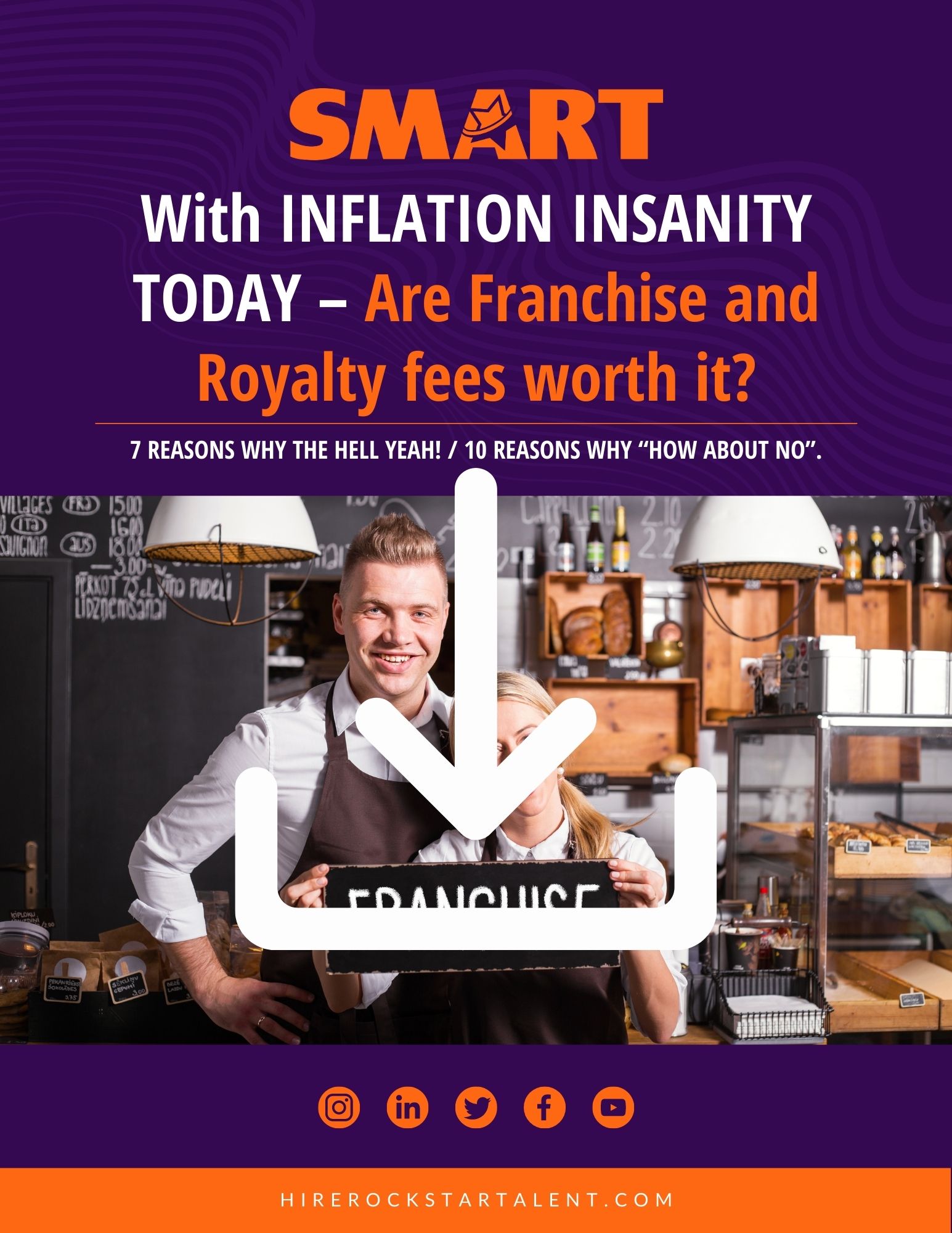Watch my video and Summary
It could be very positive and mean all the things we hope for, a RockStar but ask all the right questions.
This question gets asked all the time by hiring managers. “What is your experience?” Hiring managers look for it like they must have it. Read below to get the scoop.
Imagine…you hired a RockStar! A candidate is able to walk right in and get to work with very little training and be motivated to work. This adds solid impact right away.
But, is it as helpful as we once thought, and does it really make one candidate better than another?
Ask yourself these questions:
- Are we work-shy and just want people to function in the role quicker?
- Is experience always good?
- Does experience mean people are set in their ways and not willing to change?
- Does experience mean “I have an attitude” and don’t need to be directed and “You can’t tell me anything that I don’t already know”?
- Does “seeking an experienced bartender” mean they know how to steal?
- Does experience mean insubordination if they don’t get their way?
- Does experience mean, we are just learning what their last employer already knows?
Are you thinking differently at all about “I have experience”?
I met with a long-time Restaurant General Manager, let’s call him Tim, who works for a very successful chain. Tim has been around the block, is very experienced, and appears to understand how to motivate people. The restaurant was operating well, but initially, you could see a few signs of that entitled behavior issues.
Tim was very excited when he told me a story about a new line cook he just hired into the kitchen. This man had “experience” from another local restaurant and made grand promises of how wonderful he was and all the things that he has done.
Hiring is fun and exciting, you bring a couple of people in, and you get a euphoric feeling that “I have solved a few problems”. This is often a temporary feeling, however. Hiring is merely a “spoke” in a wheel, there are other spokes that hold the wheel together. If you make an incorrect hire, and then the person leaves or worse, drives away other good workers, then what has been solved? NOTHING!
THE SAME THINKING ABOUT HIRING
As I listened, the conversation followed the same thinking and direction as “we” (Restaurant Operators) have always thought. Making a decision based on the “the promise” and boasting of a candidate and the “puffing” of the level of experience.
He went on to explain that he brought this line cook in at a rate of $3 more an hour than a typical cook.
He went on and listed the reasons why he paid him more. The candidate promised he would save him money on training, and that he will be able to jump in immediately, and just learn their menu. Tim’s thought process was strategic in nature, but was very one-directional and scarcity-focused. “Close the candidate, and get a good line cook functioning ASAP.”
WHAT ABOUT THE OTHER PARTS OF EMPLOYEE EXPERIENCE?
My I asked Tim why he hired this guy, paid him $3 more an hour than the rest of his current team that had more time with the restaurant. He essentially started at more than the people who worked this very busy weekend, on the sole reasoning, that he flipped a steak before for someone else.
That makes very little sense to me. I know this sounds like I am belittling the candidate’s accomplishments, and that is not my intent-at all. I just feel the fact that someone “flipped a steak” for someone else is not enough information to classify it as “experience”. There are many other factors that should be considered, and if you’re not considering them, then that is why you keep ending up in the place where you are always stressing about help.
Shouldn’t experience just be about doing the technician part of the job? What about the other factors? Are you asking and getting “all” the questions answered?
SOME OF THE QUESTIONS YOU SHOULD BE ASKING JOB CANDIDATES
- Did they work when the restaurant needed them?
If the candidate can indeed “flip a steak” but didn’t work during the trying times of business, like holidays, the peak hours because their availability was poor, or they could only work in the low volume hours most times. Then you have a false expectation and don’t even know it yet.
- Did they do all the things that are important to a business, it’s brand and the culture?
-
- Were they in uniform all the time, or is there always a story about why they’re not in uniform?
- Were they on time or did they often have an excuse they weren’t?
- Do they request a lot of time off?
- Do they have “personal” problems and can’t come to work?
- Do they talk negatively and upset co-workers or customers?
- Do they regularly break company policies and procedures?
- Do they have urgency or do you seem to slow down after you walk in the front door of the restaurant, and only speed up again when it’s 10 minutes before quitting time?
-
These are just a few, I can go much deeper, but you get the point. Of course, at an interview, no one is going to tell you the truth about any of these. Many candidates will falsify or omit the truth and fabricate “what they think you want to hear”.
DO YOU HAVE A SYSTEM IN PLACE TO ASSURE YOU CALL OUT THESE IMPORTANT, CRUCIAL DECISION-MAKING PERFORMANCE INDICATORS?
Tim was seeing it. He agreed and was very intrigued in the conversation. He actually admitted that he was only planning to chat for a few minutes and make an excuse to leave. However, I struck a nerve or two.
Many restaurant operators do not have a plan that goes deep. It’s something they threw together quickly one day, and most times during the interview they don’t even look at it. There is such a lack of upfront discipline, I call this “short-term pain”. That, when ignored, turns into what I call, “long-term pain”. This is where the most damage is done, the real costs begin to add up. Those real costs include, attrition, order inaccuracy, guest service disruptions, wait times, customer complaints, cash shortages, and the list goes on.
That is all caused by the “wolf in sheep’s clothing”, the people who were not truthful and were then hired, declaring they were needing less training and able to get up to speed quicker. Those same people are now causing chaos in your company, most times being totally unaware, because it’s just who they are. They have never changed who they always were, you just overlooked these things and “hoped” they would fit into your box of what you wanted them to be.
Ever hear the saying, “The leopard can’t change its spots”? People will not change their behaviors and habits, they can try, but ultimately if they don’t want to change, they won’t.
Hire a person like that, and your RockStars are stressed when others are late and call in or don’t do their workload. Then they get frustrated when the leadership doesn’t hold people accountable, it’s like the newer people are allowed to get away with things that were never acceptable before. Hidden behind stories like, “people are different today”, and “people aren’t built the way they used to be built.”
The worst part of being sold a false bill of goods is the stress and pressure it puts on you and your team. The extra support, standing over and hovering around. Picking up the stuff they drop onto the floor, watching their every move because they forget the simple items needed to deliver to the guest or assembling the products incorrectly.
Remember, these are the ones that were brought in to “make it better”.
You have actually taken steps backward. The worst of it, is without systems in place to monitor this, you have no recourse. You made the bad deal on the compensation up front. Now the people who have been doing it for you, are resentful.
Restaurant and retail business owners essentially try to cheat and make poor decisions emotionally and at the moment. They are left without protection mechanisms in place. This happens simply because you never set the expectations upfront. You never based the compensation on FACTS and what is REQUIRED in your business. Instead, you left those things to be assumptions, “they have the experience, so they know what’s expected”.
WHERE DO YOU GO WITH PERSONNEL FROM HERE?
Hiring Managers feel if they get in a few candidates, then they will be able to have the time to work out a new system or plan going forward. However, because they are stuck in a perpetual loop of good enough for a few weeks, they end up right back where they started. They are never able to get to create a better way and system, so the problem continues, and eventually compounds.
This is where it gets tough for managers and operators like Tim. Tim’s ego would not let him admit that things could be done better. I went into his location a few days later and a newly hung “Now Hiring” Kitchen help, line cooks and Dish Washers” sign.
I agree with the statements “people aren’t the same” and “people aren’t built the way they used to be built”. These sayings back up the point that the employee pool is evolving, changing, getting more entitled, taking less responsibility, getting weaker and less skilled, and more incompetent much faster than the restaurant operator can adjust to them.
If you are bringing someone in to help the organization, solely based on “they have experience”. Then shouldn’t they actually have experience? Experience that is helpful and doesn’t compound the already stressful people problems you currently have?
Here is the kick in the pants.
You can’t really prove what we talked about to be true or false until THE CANDIDATE STARTS WORKING. All the talk is “hypothetical”, it’s what they’re saying they WILL do and potentially not what they ACTUALLY do.
This whole model has to be “flipped” around. We have been doing it wrong for many years. The metrics and compensation indicators have to be AFTER the hire and before is just empty promises and sales talk.
I, for one, am sick and tired of being sick and tired of it.
If you would like to see what I have spent the last 6 years cooking to battle this war, I would love to connect with you!
Ciao for now
For more tips, connect with us and follow us on our social channels @hirerockstartalent
Our System helps with all of this!
ABOUT THE SMART SYSTEM
SMART is a System that helps retail and restaurant owners, especially Quick Service Restaurant & Fast Casual ATTRACT, DEVELOP, ENGAGE & RETAIN RockStar Employees! Our system help’s business’s slow down the revolving door and create unpoachable, RockStar employees, who make businesses more money by delivering great customer experiences.
Learn more: www.hirerockstartalent.com


